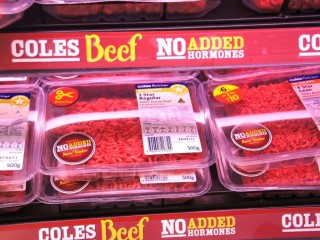 The gorilla in the room – the use of hormonal growth promotants in domestic beef production – was touched on only lightly during a presentation by Coles chief John Durkan at last week’s Australian Meat Industry Council conference on the Gold Coast.
The gorilla in the room – the use of hormonal growth promotants in domestic beef production – was touched on only lightly during a presentation by Coles chief John Durkan at last week’s Australian Meat Industry Council conference on the Gold Coast.
Somewhat surprisingly, there was not a single question raised from conference delegates about Coles’ January decisions on implant use, their impact on productivity or the environment, or related issues.
Mr Durkan aligned the company’s decision to remove HGP from its beef production system with similar decisions to move to free-range eggs, sow-stall free pork, and a WWF link in its seafood offer.
“It’s about the provenance of food,” Mr Durkan told the conference.
“There is no doubt that the consumer view (being received by Coles through survey work) was at odds with the industry. As a result we took a fair bit of flak from a whole lot of people when we decided to remove added hormones from our beef,” he said.
“We didn’t do it because it was good in terms of us being pure: it was something our customers were talking to us about.”
Mr Durkan said Coles talked with about 20,000 customers each and every month about a range of issues of importance to them.
“The HGP issue is just one of them. Nowhere did we say that added HGP was bad for the Australian nation, but it was really important to our customers, our surveys showed.”
Coles now had a supply chain that was ‘completely hormone free’ and customers were rewarding the company in terms of sales, he said.
“We’ve seen double-digit growth in our beef business since the program was implemented, and it is one of many similar measures we have employed over the past three years of company refocus. Another example is phasing out the use of sow-stalls. Not only domestic pork, but imported pork will have a sow-stall free status,” he said.
Similarly, free-range eggs were something that Coles' customers said they wanted. While Coles still stocks eggs from caged birds, they were not retailed under the Coles brand. Free-range egg sales had expanded as a result.
The company would also launch a raft of ‘ethically sourced’ products around its upcoming Christmas festive season offer, Mr Durkan said.
During questiontime, Mr Durkan was asked about the challenge of maintaining long-term sustainable agricultural production, given its HGP stance.
He said while customers did not typically ask that question directly, their comments were more related to ‘importance of local’ and ‘importance of fresh food’ issues across Australia.
“There is a high demand for products made and produced in Australia. One the sustainability issue, we are starting to see some questions coming through on is GM foods and the issues around that.”
He pointed to the ‘whole load of primary industry that had been sold to overseas competitors’, of particularly concern in sectors like the dairy industry.
“We're working hard to lock-up supply chains so that we do have long-term supply arrangements here in Australia that can meet the demands of the Australian consumer."
Beef Central asked Mr Durkan about the impact of Coles’ major store refurbishment campaign on beef sales on a store-by-store level, and the potential for greater use of centralised processing and innovative packaging solutions in driving the company’s future supply chain efficiency plans.
He said in the 150 stores that had undergone the refurb program with a radically revised meat department, there was typically very significant growth in sales – often in double digits.
“But the meat department cannot be revise in isolation to achieve that. The customers think of that whole fresh food section all in one, so the bakery must also be revitalised, and the fruit and veg section.”
“But we have to give them substance as well: it’s not just about making the department look good, the quality of the product must also improve.”
While some stores were still ordering product on the basis of ‘order day one for sale on day four’, the ultimate aim was to reduce that to ‘day one for day two’, delivering much fresher product to customers and making the supply chain more efficient, getting producers much closer to demand patterns.
That process might take 18-24 months to deliver, he said.
- See separate story today on Coles' retail renaissance
